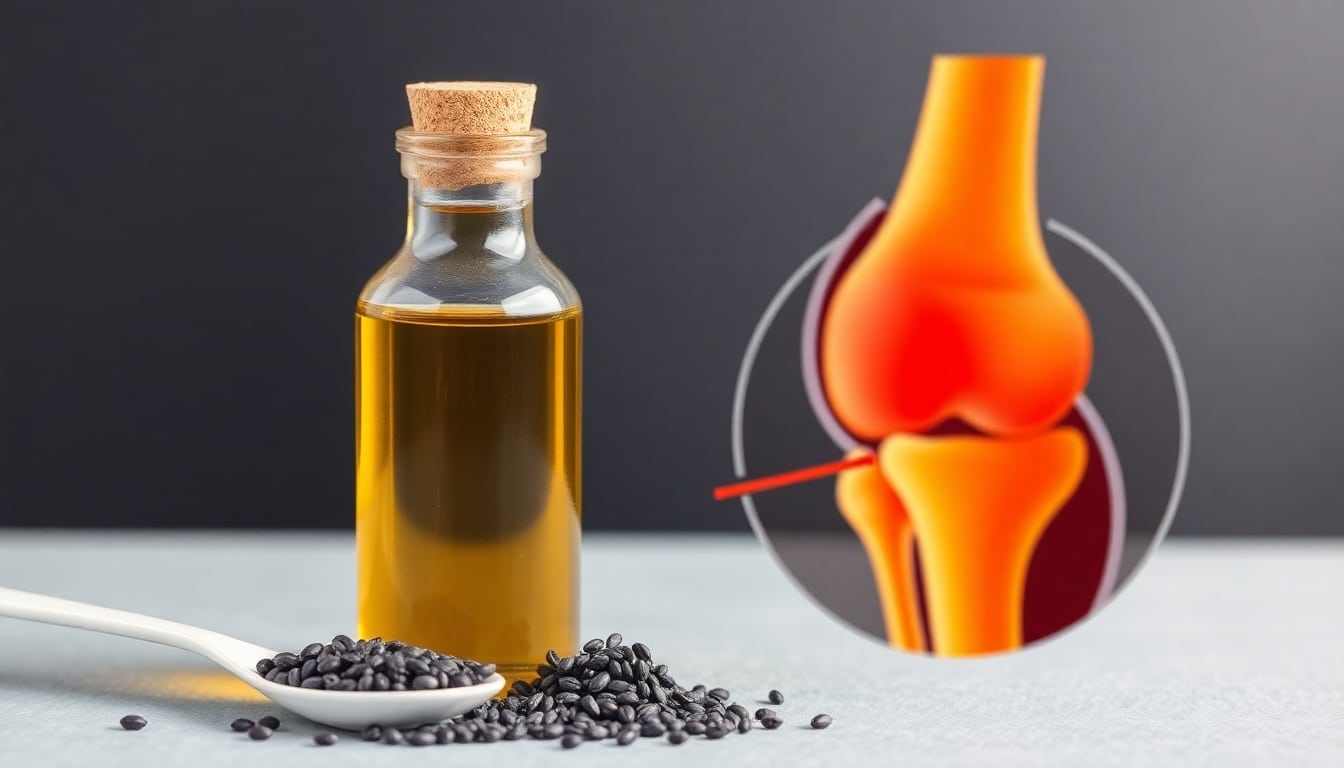
This Ancient Seed Oil May Calm Knee Pain Better Than Tylenol, Study Finds
This Ancient Seed Oil May Calm Knee Pain Better Than Tylenol, Study Finds
If you’re one of the millions of adults struggling with the daily ache of knee osteoarthritis, you’ve probably turned to familiar pain relievers like Tylenol for help. But what if relief could come from something far more natural—an oil pressed from tiny black seeds that have been used in traditional medicine for over a thousand years?
A new clinical trial suggests that black seed oil—derived from Nigella sativa, an ancient medicinal plant—may actually outperform Tylenol (acetaminophen) when it comes to soothing knee pain. For anyone seeking a gentler, natural alternative to conventional painkillers, the findings are both fascinating and hopeful.

Key Takeaways
🌿 Black Seed Oil Outperformed Tylenol: A clinical study found that applying black seed oil directly to the knee significantly reduced osteoarthritis pain—more effectively than oral Tylenol.
🦵 Greater Pain Reduction: Participants who massaged the oil onto their joints experienced noticeably more relief than those who took the common over-the-counter medication.
⚖️ A Natural Alternative: With growing concerns about the long-term side effects of painkillers, black seed oil offers a promising, plant-based solution for chronic joint pain.
The Study: Nature vs. Pharmacy
To test the ancient remedy against a modern standby, researchers recruited 40 elderly participants, all diagnosed with knee osteoarthritis. The average age was 77, and every participant reported persistent joint pain that affected their mobility and quality of life.
The volunteers were divided into two equal groups for a three-week trial:
-
Group A massaged 1 milliliter of black seed oil onto their painful knee three times daily.
-
Group B took a standard 325 mg Tylenol tablet, also three times a day.
The goal was simple but profound—determine which method provided more meaningful relief from osteoarthritis pain.
The Surprising Results
At the end of the study, both groups reported improvement. However, the black seed oil group saw a significantly greater reduction in pain compared to those taking Tylenol.
In fact, researchers concluded that topical black seed oil was more effective than acetaminophen for relieving knee pain in older adults. This is a striking finding—suggesting that a traditional natural remedy might not only match, but surpass, one of the most widely used pain medications in the world.
The results also echo centuries of anecdotal evidence. For generations, black seed oil has been used across the Middle East, Asia, and Africa to ease inflammation, support joint health, and promote overall vitality. Now, science appears to be catching up to what ancient healers already knew.
Why Look Beyond Tylenol?
Tylenol (acetaminophen) has long been a go-to pain reliever, but it’s not without its drawbacks. While generally considered safe in the short term, long-term or high-dose use can strain the liver, cause digestive issues, and even contribute to mood changes or fatigue.
Other common painkillers, like NSAIDs (ibuprofen and naproxen), can also lead to stomach irritation, ulcers, high blood pressure, or kidney problems with prolonged use. For many people—especially older adults already managing multiple medications—these side effects are reason enough to look for alternatives.
That’s where black seed oil comes in. When used topically, it’s absorbed through the skin, working locally to ease inflammation and stiffness without burdening your digestive system or liver. It’s a gentle yet powerful option that taps into your body’s natural healing pathways.
What Makes Black Seed Oil So Special?
Black seed oil isn’t a single chemical compound—it’s a complex, nutrient-rich blend of natural substances that work together in harmony. This “whole food” approach may be one reason it performs so well in studies.
Here’s a closer look at its active powerhouses:
-
Thymoquinone, the star compound in black seed oil, has strong anti-inflammatory and antioxidant properties. It helps calm swelling and neutralize harmful free radicals in the joints.
-
Essential fatty acids, including omega-6 and omega-9, nourish connective tissue and may support joint lubrication.
-
Vitamins and minerals like vitamin E, zinc, and calcium contribute to tissue repair and resilience.
-
Plant-based compounds such as p-cymene and carvacrol offer antimicrobial and analgesic effects—helping soothe discomfort naturally.
Unlike synthetic drugs that target one specific pathway, the synergy of these compounds may explain why black seed oil can bring relief without the harsh side effects. Nature, after all, rarely works in isolation.
A Return to Nature’s Pharmacy
This isn’t the first time researchers have spotlighted black seed oil’s health benefits. Earlier studies have linked it to improvements in inflammation, metabolism, and immune balance, as well as support for conditions like asthma and eczema.
Now, with clinical evidence showing its potential to ease osteoarthritis pain, it could soon find a place in natural pain management plans. For anyone frustrated by the limitations—or side effects—of conventional painkillers, this research offers a refreshing, science-backed alternative.
As always, it’s wise to speak with your healthcare provider before trying any new treatment, especially if you’re already taking medications. But for many, adding black seed oil as a topical supplement could be a safe and effective way to support joint comfort naturally.
How to Use Black Seed Oil for Knee Pain
If you’re curious to try it, here are a few simple steps:
-
Choose a high-quality oil. Look for cold-pressed, pure Nigella sativa oil from a reputable brand to ensure potency and purity.
-
Apply gently. Massage 1–2 mL of the oil into the affected knee 2–3 times a day. The massage itself can also increase blood flow and flexibility.
-
Be consistent. Natural remedies often work gradually—give it at least a few weeks to notice results.
-
Pair it with movement. Gentle stretching, yoga, or short walks can help the oil’s anti-inflammatory effects go even further.
Some people even blend black seed oil with other soothing oils like castor oil or olive oil for extra nourishment.
The Bottom Line: Relief Can Be Natural
The idea that a simple seed oil could outperform one of the world’s most common painkillers might sound surprising—but that’s exactly what this new research suggests.
By turning to time-tested, natural remedies like black seed oil, we may be rediscovering an ancient truth: the body often responds best to gentle, holistic care. For those living with knee osteoarthritis, this study offers more than hope—it offers a practical, affordable, and safe way to reduce pain and improve daily comfort.
Sometimes, the most powerful medicine doesn’t come in a pill bottle—it comes from nature itself.
Source: Recent clinical study on the comparative effects of topical Nigella sativa oil and oral acetaminophen in elderly patients with knee osteoarthritis.
News in the same category


Proven Health Benefits and Uses of Thyme and Thyme Tea

9 cancer warning signs your body is sending you (don’t ignore these!)

Your legs have a “second heart” — and one simple move can reactivate it fast

Doctor warns: your ‘healthy’ lemon water habit is actually destroying your liver – here’s what you’re doing wrong

How to Tell If You Have Intestinal Parasites and What to Do About That

2026’s hottest health drink: A natural boost for blood pressure and diabetes

This Salt, Pepper and Lemon “Miracle-Mix” Can Help Solve 9 Problems

Scientists Discover The Maximum Age a Human Can Live To

Signs of Arthritis You Shouldn’t Ignore

The Life-Changing Effects Of Adding Just A Pinch Of Baking Soda To Your Water

WHAT HAPPENS WHEN YOU EAT 3 WHOLE EGGS EVERY DAY — THE RESULTS MAY SURPRISE YOU

Remove This from Your Home to Live Longer

This Common Vitamin Deficiency Could Be Raising Your Colorectal Cancer Risk — and Half the World Is Affected

Lower Blood Sugar Naturally by Training Just Two Leg Muscles

Forget Aspirin — This Everyday Fruit Could Protect You from Stroke and Heart Attack

Garlic, honey, and cloves – a powerful natural remedy packed with health benefits

Anyone Whose Hair Is Falling Out Needs To Make This 2-Ingredient Drink Immediately
News Post

The White House Communications Office is saying our story is not true. We stand by our story. Our story is accurate.

D4vd's Friends Thought He Was Celeste Rivas' Boyfriend, Thought She Was 19

Netflix's Being Eddie release date and what to expect from the Eddie Murphy special

Man Builds “Museum Of Love” To Honor Late Wife’s Memory

MAFS UK's Julia-Ruth issues statement after 'three husbands' bombshell

Strictly star Harry Aikines-Aryeetey addresses ‘heartbreaking’ elimination: ‘It’s nice to go out on a party’

Seven Types of Pain You should Never Ignore

Proven Health Benefits and Uses of Thyme and Thyme Tea

Stop throwing out old plastic food containers

6 things that mice are very afraid of

9 cancer warning signs your body is sending you (don’t ignore these!)

Your legs have a “second heart” — and one simple move can reactivate it fast

Doctor warns: your ‘healthy’ lemon water habit is actually destroying your liver – here’s what you’re doing wrong

Why You Shouldn’t Rush to Fold the Bed When Checking Out of a Hotel

You are doing it all wrong. Here's the right way to boost your immunity naturally

My ear feels clogged all the time, but nothing comes out. No wax of fluid. Doctor appt is far away. What could this be?

Wow, I never knew this!

How to Tell If You Have Intestinal Parasites and What to Do About That

Morehouse Students Appear in ‘Vogue’ To Reflect On Legacy of Style in Honor of MLK Day
